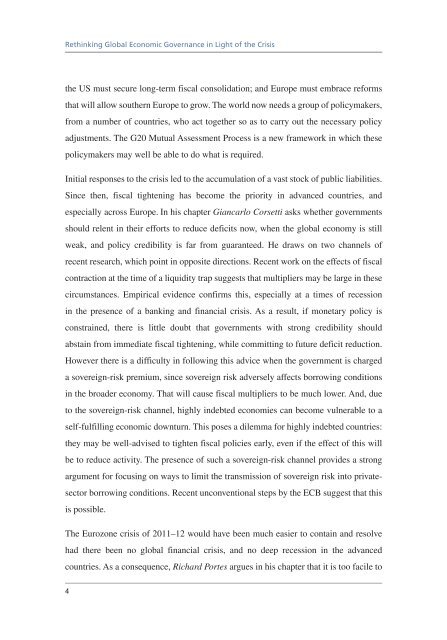Download PDF - Vox
Download PDF - Vox
Download PDF - Vox
- No tags were found...
You also want an ePaper? Increase the reach of your titles
YUMPU automatically turns print PDFs into web optimized ePapers that Google loves.
Rethinking Global Economic Governance in Light of the Crisisthe US must secure long-term fiscal consolidation; and Europe must embrace reformsthat will allow southern Europe to grow. The world now needs a group of policymakers,from a number of countries, who act together so as to carry out the necessary policyadjustments. The G20 Mutual Assessment Process is a new framework in which thesepolicymakers may well be able to do what is required.Initial responses to the crisis led to the accumulation of a vast stock of public liabilities.Since then, fiscal tightening has become the priority in advanced countries, andespecially across Europe. In his chapter Giancarlo Corsetti asks whether governmentsshould relent in their efforts to reduce deficits now, when the global economy is stillweak, and policy credibility is far from guaranteed. He draws on two channels ofrecent research, which point in opposite directions. Recent work on the effects of fiscalcontraction at the time of a liquidity trap suggests that multipliers may be large in thesecircumstances. Empirical evidence confirms this, especially at a times of recessionin the presence of a banking and financial crisis. As a result, if monetary policy isconstrained, there is little doubt that governments with strong credibility shouldabstain from immediate fiscal tightening, while committing to future deficit reduction.However there is a difficulty in following this advice when the government is chargeda sovereign-risk premium, since sovereign risk adversely affects borrowing conditionsin the broader economy. That will cause fiscal multipliers to be much lower. And, dueto the sovereign-risk channel, highly indebted economies can become vulnerable to aself-fulfilling economic downturn. This poses a dilemma for highly indebted countries:they may be well-advised to tighten fiscal policies early, even if the effect of this willbe to reduce activity. The presence of such a sovereign-risk channel provides a strongargument for focusing on ways to limit the transmission of sovereign risk into privatesectorborrowing conditions. Recent unconventional steps by the ECB suggest that thisis possible.The Eurozone crisis of 2011–12 would have been much easier to contain and resolvehad there been no global financial crisis, and no deep recession in the advancedcountries. As a consequence, Richard Portes argues in his chapter that it is too facile to4














